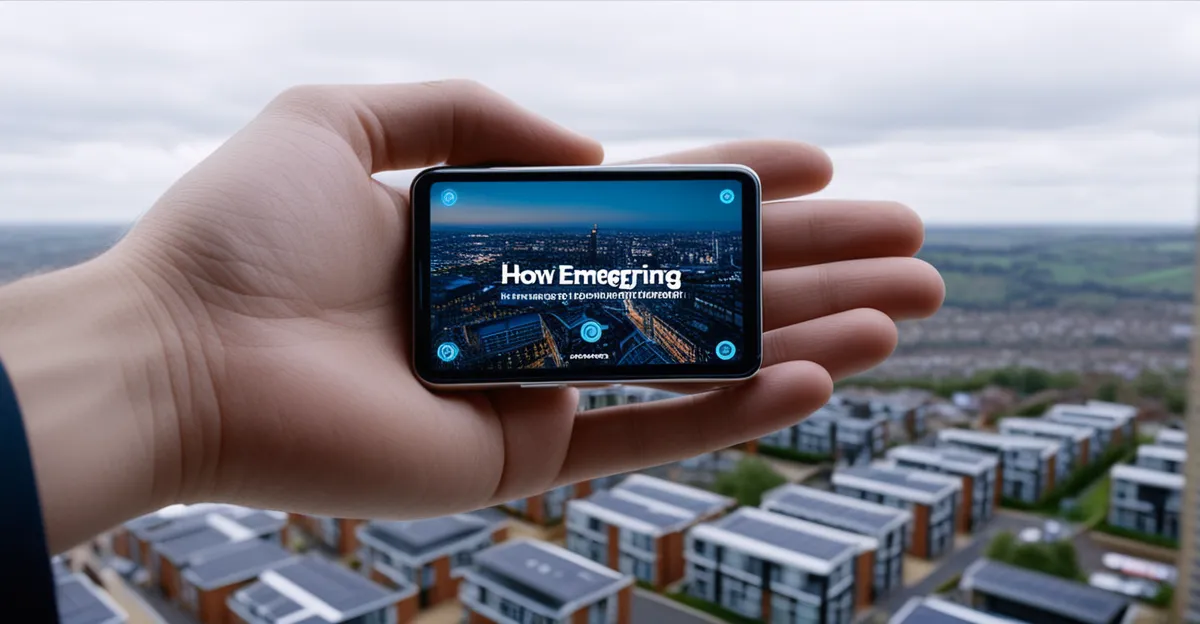Transformative Technologies Shaping the UK Real Estate Market
Emerging technologies are rapidly redefining the UK real estate trends, creating new opportunities and challenges. Central to this transformation is property technology, or proptech, which integrates advanced tools like AI in real estate, blockchain, and smart building systems to improve efficiency and transparency. Adoption of these technologies is gaining momentum, influencing both residential and commercial property markets.
AI enhances decision-making by analyzing vast datasets for market predictions and valuations, while blockchain enables secure, transparent property transactions through immutable records and smart contracts. Smart buildings leverage IoT for energy efficiency, security, and tenant comfort, aligning with sustainability goals. The cumulative effect is a dynamic shift towards digital transformation in the property sector.
Have you seen this : How Can Real Estate Investments in the UK Shape the Future of Sustainable Finance?
Early adoption is particularly noticeable among progressive UK estate agencies and commercial developers seeking competitive advantages. As the incorporation of these technologies grows, the market reflects significant improvements in operational efficiency, user experience, and investment attractiveness. While the pace and extent of adoption vary, the trajectory clearly points to a future where emerging technologies are integral to the UK real estate ecosystem.
Transformative Technologies Shaping the UK Real Estate Market
Emerging technologies are rapidly redefining the UK real estate trends by introducing innovative tools and systems that enhance efficiency and transparency. Among these, AI in real estate and blockchain stand out as major forces driving change. AI enables advanced data analytics and automation, improving property valuation accuracy and client engagement. Blockchain contributes by securing transactions and enabling smart contracts that reduce fraud and speed up deal finalization.
In parallel : Are Property Investment Trends Shifting in the UK Real Estate Market?
Property technology, or proptech, is integral to this evolution. It connects traditional real estate practices with digital solutions, fostering increased adoption of smart buildings equipped with Internet of Things (IoT) devices. These smart buildings optimize energy consumption, enhance security, and provide better tenant experiences through real-time monitoring and automated controls.
Technology adoption in UK real estate is progressing, with more residential and commercial markets embracing these digital tools. For instance, developers and property managers utilize AI-driven predictive analytics to assess market trends and tenant demand. Moreover, the integration of blockchain is gradually transforming digital property transactions by boosting transparency and lowering operational risks. These combined effects are reshaping how properties are developed, managed, and transacted across the UK.
Artificial Intelligence and Automation in Property Services
AI in real estate is transforming how property valuations, client interactions, and market predictions occur. AI-driven tools apply complex algorithms to analyze historical and real-time data, enabling remarkably precise property valuations and forecasting market trends. This predictive analytics function allows UK estate agencies and developers to make data-backed decisions swiftly, reducing risks and increasing profitability.
Automation enhances property management by streamlining routine tasks like tenant communications, rent collection, and maintenance scheduling. This property management automation frees up human resources for more value-added activities, raising operational efficiency and improving client satisfaction. Digital transformation in real estate is increasingly evident as platforms integrate AI-powered chatbots, virtual tours, and automated document processing.
Many UK agencies adopt predictive analytics tools creating tailored investment strategies. For example, AI technology can identify neighborhoods with rising demand or depreciation risks. Additionally, automation accelerates transaction processes, reducing manual errors and delays. This technological adoption reshapes customer experiences and internal workflows, marking a significant step in modernizing the UK property sector with practical, scalable AI applications.
Artificial Intelligence and Automation in Property Services
AI in real estate is revolutionizing how valuations, client interactions, and market predictions are conducted. Using AI-driven tools, estate agents and developers analyze extensive datasets to enhance valuation accuracy, improving investment decisions. Predictive analytics, a key AI application, forecasts property demand and price trends with precision, allowing proactive strategy adjustments.
Automation complements this digital transformation in real estate by streamlining tasks such as tenant management, maintenance scheduling, and transaction processing. Property management automation reduces manual workload and errors, boosting operational efficiency. For example, many UK agencies deploy chatbots for instant client communication and AI-powered platforms to automate contract preparation.
AI adoption among UK real estate professionals is growing rapidly. Developers leverage these technologies to optimize project planning and pricing, while agencies enhance client engagement through personalized recommendations. This shift not only accelerates transaction times but also elevates service quality, demonstrating how AI and automation are integral to the evolving UK real estate landscape. Embracing these tools enables stakeholders to stay competitive amidst changing market dynamics driven by emerging technologies.
Blockchain and the Rise of Digital Property Transactions
Blockchain in real estate is fundamentally transforming digital property transactions by providing a secure, transparent, and tamper-proof framework. This technology records every step of a property deal on a decentralized ledger, drastically reducing fraud risk. UK market players increasingly recognize how blockchain creates trust through verifiable transaction histories, making property sales and leases more efficient.
A core feature driving this shift is the use of smart contracts—self-executing codes that automatically enforce terms once criteria are met. These contracts reduce the need for intermediaries and speed up deal closures. However, smart contract adoption in the UK faces legal and practical limits. Current regulations are evolving, and full automation requires integrating with traditional legal processes and property registries.
Notable UK examples show blockchain improving transparency in land registry data and fractional property ownership platforms. These applications reveal how blockchain in real estate supports secure estate deals by validating ownership and enabling instant settlements. While widespread usage remains emerging, the technology’s potential to streamline UK property market transactions is considerable, promising lower costs and enhanced security across residential and commercial sectors.
Transformative Technologies Shaping the UK Real Estate Market
Emerging technologies are fundamentally reshaping UK real estate trends, with property technology at the forefront. These innovations are driving efficiencies in both residential and commercial markets by automating processes and improving data transparency. Technologies like AI in real estate deliver enhanced market predictions and personalized client services, based on analyzing complex datasets more accurately than traditional methods.
Blockchain adoption ensures secure, transparent transactions, reducing fraud risks and operational delays by using immutable ledgers. This transformative tool builds trust among stakeholders while facilitating smoother property transfers. Meanwhile, smart buildings equipped with IoT sensors enhance energy management, security, and tenant comfort, aligning with sustainability goals increasingly prioritized by developers and regulators in the UK.
Technology adoption is uneven but accelerating, with early adopters including progressive estate agencies and commercial developers. They gain competitive advantages by using AI-driven insights and blockchain platforms for transactions, alongside smart building systems that optimize resource use and tenant experience. These emerging technologies collectively herald a significant shift, moving the UK real estate sector toward comprehensive digital transformation and sustainability, changing how properties are valued, managed, and transacted across the market.










